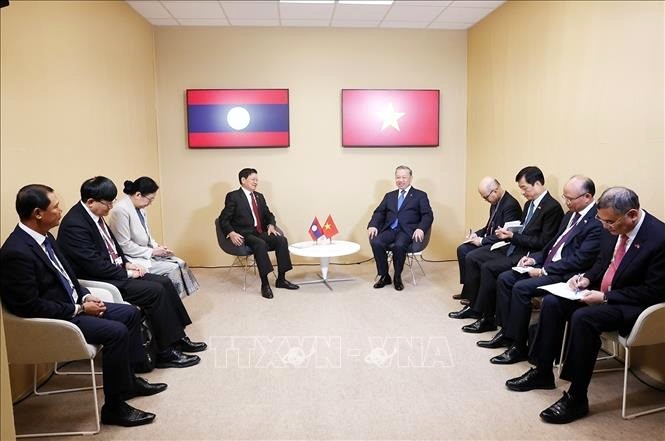Vietnam values special relationship with Laos
VOV.VN - Vietnam and Laos have treasured a special relationship that is an invaluable asset and a rare, exemplary bond characterized by loyalty and purity in international relations, said a senior Vietnamese leader.

Party General Secretary and President To Lam of Vietnam was speaking during his meeting in Paris on October 5 with his Lao counterpart Thongloun Sisoulith, on the sidelines of the 19th Francophonie Summit.
To Lam expressed his appreciation for the mutual support between Vietnam and Laos in overcoming the recent impacts of natural disasters, reflecting the brotherly sentiments and the longstanding tradition of mutual assistance between the two countries.
Sisoulith for his part emphasized that Laos places great importance on its relationship with Vietnam. He highlighted the two countries’ continued efforts to cultivate and develop the great friendship, special solidarity, and comprehensive cooperation between Vietnam and Laos in a sustainable and extensive manner.
The mutual concern and support in addressing the impacts of natural disasters demonstrate the close comradeship and traditional mutual assistance between the two peoples, he said.
The Lao leader conveyed warm regards to Prime Minister Pham Minh Chinh and Chairman of the National Assembly Tran Thanh Man, recalling the positive outcomes of his state visit to Vietnam and the annual meeting between the two Politburos in September 2024.
Both leaders praised the results of bilateral cooperation in implementing major directions agreed upon during their recent meetings, and vowed to closely monitor relevant agencies to effectively implement high-level agreements and cooperative programs between the two sides.
In the context of complex global developments, the two leaders underscored the value of solidarity among Vietnam, Laos, and Cambodia. They agreed to continue coordinating with Cambodia to make the trilateral cooperation increasingly substantive and effective, meeting the practical needs of the three countries and aligning with development requirements in the new phase.


